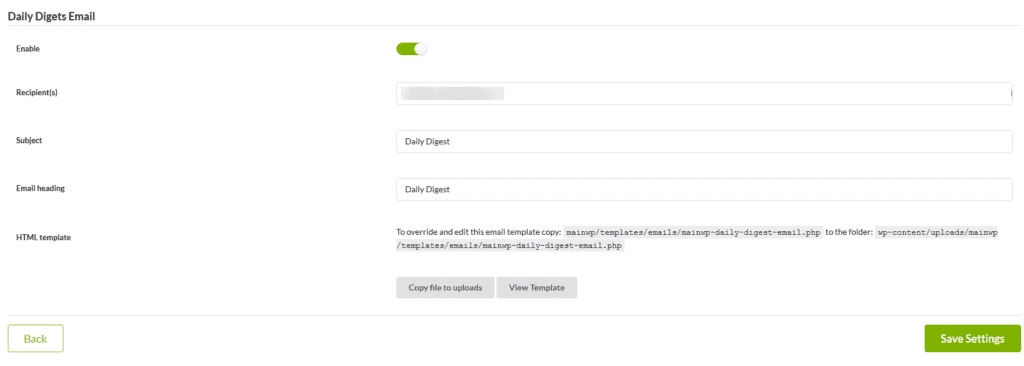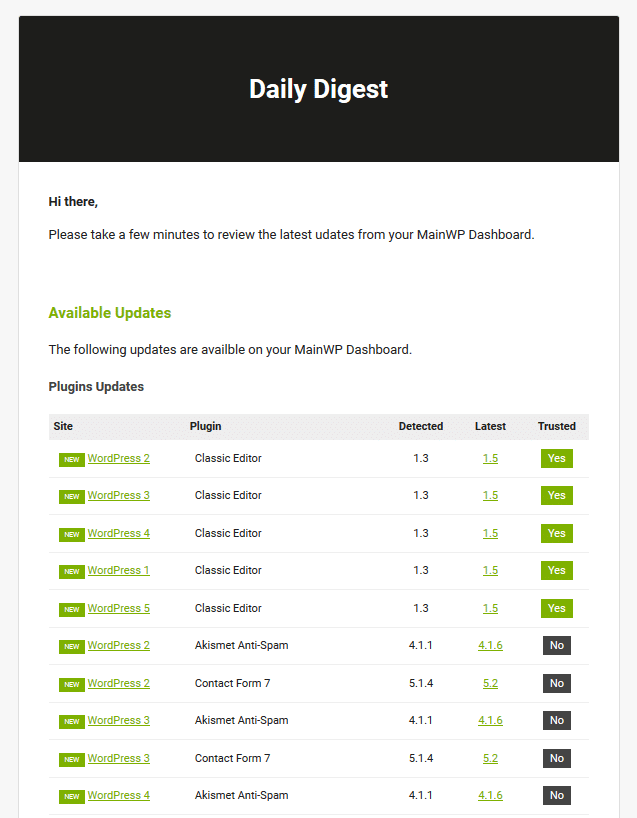The MainWP team has been working for a few months on MainWP 4.1, a relatively big release that includes one of the most significant refactorings and documentation of the MainWP Dashboard and Child codebase ever.
This release was internally codenamed “Developer,” but it could have been just as easy to call it “Code Clean-Up,” and we didn’t do this just for fun. These changes were needed to remove spaghetti code and pay off the technical debt created over the years.

You may not notice many user interface (UI) changes with version 4.1, but, under the hood, this version has over 150,000 code changes from version 4.0!!
And these changes are not just for Coders and Developers; by changing the plugins to meet WordPress Coding Standards, it also increases the system’s stability for everyone.
But 4.1 wasn’t just about code changes; it also introduces some new features!
New Features in 4.1:
Three of the most important additions to this version are Basic Uptime Monitoring, Site Health Monitoring, and Email Settings.
Email Settings introduces a templating system for email notifications that your MainWP Dashboard sends. This update means that you will be able to customize emails fully.
Basic Uptime Monitoring
Depending on the selected frequency (from 5-minutely to once daily), your MainWP Dashboard will send a simple HTTP request (via cURL) to get the HTTP Header response from the site. In case your child site doesn’t return Status Code 200 (OK), your MainWP Dashboard will notify you immediately via email notification.
This feature doesn’t rely on any 3rd-party service, such as Uptime Robot or anything similar. In other words, this feature enables you to monitor your sites for free, regardless of the number of child sites that you manage.
Site Health Monitoring
WordPress 5.1 introduced Site Health, which is a suite of features focused on website security and speed. MainWP Site Health Monitoring feature allows you to set if you want to be notified about your child sites Health status or only if it goes under the status Good.
Site Health Monitoring Page
The whole new Monitoring page is developed to accompany the new monitoring feature. The page provides you a list of your child sites and the last detected status code, site health, and options to check sites on-demand or see site preview.
Review our all-new Knowledge Base for more information on Site Health Monitoring
Email Settings
Starting with 4.1, you will have now have full control over the email notifications that your MainWP Dashboard plugin sends.
The new UI will provide you an easy way to Enable/Disable email notifications, manage recipients, and even create an entirely new email template.
All email settings are manageable globally and on a per-site basis, which means that your MainWP Dashboard can send all emails to you as an administrator and if needed, individual emails to your clients containing info only for a specific client’s website.
Email Templates
In this version, we changed the default email template, and we made email templates fully customizable.
You can copy the default template to the suggested location and make changes to it.
Review our all-new Knowledge Base for more information email settings documentation.
For Coders and Developers:
One of the primary reasons for this code refactoring is to attract more WordPress developers that want to develop their MainWP Extensions either for themselves or for sale.
We came to realize, as the MainWP userbase grew, we would never have the time to develop and support all the individual extensions users wanted. The best way to handle this was to use our limited resources and make Extension development easy for any WordPress coder.
During the code refactoring, we made sure that the MainWP code meets WordPress plugin coding standards. Metting the coding standards will make it easy to understand how to write their Extensions since we believe this benefits all MainWP users.
While rewriting the code, we added a dedicated development site MainWP.dev, which provides tutorials, details on each of over 500 available actions and filters, and links to our all-new code reference site, which goes over every class in both the MainWP Dashboard and Child plugin.
If you have a question about MainWP Development, please ask in our dedicated MainWP Development Community.
Finally:
Update your Extensions!
If you are running any MainWP created Extensions, you will need to update them. All of our Extensions have been updated to support the new code changes. Be sure to update all your Extensions after you update your MainWP Dashboard and Child.
We hope you are as excited about the release of MainWP 4.1 as we are, and please leave any comments, bugs, love, or hate in the MainWP Community.











